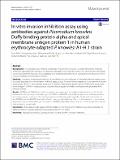In vitro invasion inhibition assay using antibodies against Plasmodium knowlesi Duffy binding protein alpha and apical membrane antigen protein 1 in human erythrocyte-adapted P. knowlesi A1-H.1 strain
Abstract
Background: The rapid process of malaria erythrocyte invasion involves ligand-receptor interactions. Inducing antibodies against specific ligands or receptors that abrogate the invasion process is a key challenge for blood stage vaccine development. However, few candidates were reported and remain to be validated for the discovery of new vaccine candidates in Plasmodium knowlesi. Methods: In order to investigate the efficacy of pre-clinical vaccine candidates in P. knowlesi-infected human cases, this study describes an in vitro invasion inhibition assay, using a P. knowlesi strain adapted to in vitro growth in human erythrocytes, PkA1-H. 1. Recombinant proteins of P. knowlesi Duffy binding protein alpha (PkDBPα) and apical membrane antigen 1 (PkAMA1) were produced in Escherichia coli system and rabbit antibodies were generated from immune animals. Results: PkDBPα and PkAMA1 recombinant proteins were expressed as insoluble and produced as a functional refolded form for this study. Antibodies against PkDBPα and PkAMA1 specifically recognized recombinant proteins and native parasite proteins in schizont-stage parasites on the merozoite organelles. Single and combination of anti-PkDBPα and anti-PkAMA1 antibodies elicited strong growth inhibitory effects on the parasite in concentrationdependent manner. Meanwhile, IgG prevalence of PkDBPα and PkAMA1 were observed in 13.0 and 46.7% in human clinical patients, respectively. Conclusion: These data provide support for the validation of in vitro growth inhibition assay using antibodies of DBPα and AMA1 in human-adapted P. knowlesi parasite PkA1-H. 1 strain.
Citation
Muh , F , Lee , S-K , Hoque , M R , Han , J-H , Park , J-H , Firdaus , E R , Moon , R W , Lau , Y L & Han , E-T 2018 , ' In vitro invasion inhibition assay using antibodies against Plasmodium knowlesi Duffy binding protein alpha and apical membrane antigen protein 1 in human erythrocyte-adapted P. knowlesi A1-H.1 strain ' , Malaria Journal , vol. 17 , 272 . https://doi.org/10.1186/s12936-018-2420-4
Publication
Malaria Journal
Status
Peer reviewed
ISSN
1475-2875Type
Journal article
Collections
Items in the St Andrews Research Repository are protected by copyright, with all rights reserved, unless otherwise indicated.

